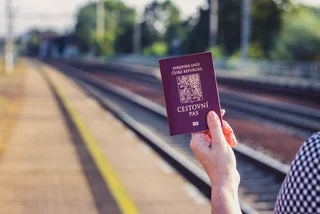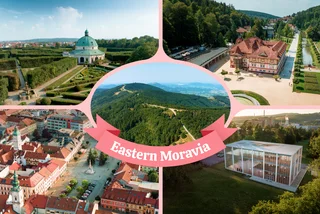Schengen. Those two syllables can strike fear and confusion in the hearts of many a non-EU expat. When the Czech Republic joined this “borderless Europe” zone in December 2007, it caused mass panic amongst non-legal expats, and even some legal ones as well due to the lack of information, or the mis-information floating around leading up to, and for months following the entry date. The difficulty of finding correct information, and the extra processing time at various embassies and the foreign police due to a backload of visa applications, magnified the problem.
To get a general overview of the Schengen zone and how it applies to foreigners living in Prague, we went straight to the source: Robert Solich, who works in the Unit for Coordination of Schengen Cooperation which is part of the Department for Asylum and Migration Policy in the Ministry of Interior.
First, a quick definition of “Schengen”: it´s simply a small town in Luxembourg where in 1985 the Schengen Agreement was signed, followed in 1990 by the Schengen Convention. Basically, these two international agreements allow for free movement within the participating countries. That means no border checks, but also as Solich says, additional requirements of all the Schengen member states regarding “a common visa regime, improving coordination between the police, customs and the judiciary and taking additional steps to combat problems such as terrorism and organized crime.” Currently, there are 24 Schengen countries. And as Solich points out, there are more benefits then just the ease of crossing borders. “Schengen allows people to cross borders anywhere and anytime which saves time, fuel, money, nerves – and it supports cross-border contacts (social, business.) Moreover, thanks to improved police cooperation and other compensatory measures we can speak about a new quality of security.”
The following has changed for non-EU foreigners:
Short term stays of up to three months for people from visa-free countries (citizens whose government has visa-free relations with the Czech Republic.) Many people, especially Americans, lived in the Czech Republic for years; popping across to Germany, Poland or Austria every three months to receive a new “stamp” and legally extend their visa-free stay. These people were greatly affected by Schengen entry: you just can´t do that anymore. If you fall into this category, you can only be in any Schengen country for up to three months within a six month period. So in order to receive a new “stamp” not only do you need to leave the Schengen zone, you need to be gone for three months total within the six months. That means if you spend three straight months in Schengen, you must leave for the next three months OR if you only spend two months in the Schengen zone, you can leave for one month, then return for one month, and then leave for two more months.
Short stays of foreigners from visa countries now need to obtain a visa which is valid for the entire Schengen zone, not just the Czech Republic. Citizens of countries who have a visa requirement and are living here under a long-term stay with a residence permit can now travel freely within the Schengen zone, whereas before they needed to have an additional visa.
Solich sums it up: “This means that Schengen eased traveling for Czech and other EU citizens, Schengen visa holders and residence permit holders. On the other hand, for visa-free foreigners the rules are stricter than before or, more precisely, they are not so easy to evade.”
The different types of visas/residence permits can be an issue of confusion as well. There are two types of residence permits: Long-term (Povolení k dlouhodobému pobytu) and Permanent (Povolení k trvalému pobytu.) Third country nationals are eligible for either of these. To know if you have one – look on your visa where it says “Typ povolení.” If you are holder of one of these visas, you can travel freely in the Schengen zone for up to three months before either returning to the Czech Republic or leaving the Schengen zone. The travel rules apply also if you are a holder of a Residence card of a family member of an EU citizen (Průkaz o pobytu rodinného příslušníka občana EU;) a Permanent residence card (Průkaz o povolení k trvalému pobytu) or have a Permanent residence permit for a national of Iceland, Liechtenstein, Norway or Switzerland and his/her family member (Povolení k trvalému pobytu občana státu Island, Lichtenštejnsko, Norsko nebo Švýcarsko nebo jeho rodinného příslušníka.)
Now, if you are here on a visa, the rules are a little more confusing, especially because the rules are different for people from visa-free countries and visa required citizens. If you have a Czech national short stay visa (české krátkodobé vízum) you can enter, stay and exit the Czech territory for up to 90 days. This is a so-called category C visa – on your visa you´ll see a C in the “typ víza” if this is what you have. This visa isn´t going to be issued any longer, but will be replaced by the uniform Schengen visa – Category C (jednotné schengenské vízum – typu C.)
You may have a long-stay visa – Category D (dlouhodobé vízum – typu D.) Again, look on your visa in the “typ víza” spot to see if you have it. This visa is for people wishing to stay longer than 90 days. It only allows for transit of up to five days through other Schengen countries on the way to the Czech Republic. Under EU law, repeat transit is not guaranteed, only one way movement from abroad to the visa issuing country. If you are from a visa-free country this is all you will have, but you can travel freely for any three months within a six month period. This is a new change resulting from a European Commission interpretation of the European visa rules, which was presented to member states in June 2008.
People from visa required countries may have a long-stay visa – Category D+C (dlouhodobé vízum – typu D+C) which is good for stays of longer than 90 days and does allow movement within the Schengen zone, but only for the first three months of the validity of the visa. After three months, you can´t transit, but it is still better because instead of the right to transit, you have a right to travel for three months. Solich adds that if you have a D+C visa and want to travel you should ask for a short-term visa from the consulate of the country you are going to.
So what do you do is you are caught living here illegally? If it´s your first offense, Solich says you´ll be given a fine of up to 5,000CZK and ordered to leave within a set time period, for example, within 10 days. In more serious cases, like you´ve been here a really long time, you´ve ignored a previous order to leave, you have committed some other offenses, etc. you´ll receive an administrative expulsion which includes a ban to return for a set amount of time. An additional change in the law following joining Schengen regards if you are expelled from the country. Solich says if you are prohibited from returning for a certain period of time (for example, three years) the ban applies for all Schengen countries, not just the Czech Republic. He says your personal information will be entered in the Schengen Information System which is shared by all Schengen countries and is accessible by all their border police. So if you try and enter during your banned period, your name will come up and it won´t be possible to enter any Schengen country, much less get a visa or residence permit.
Solich notes a few common Schengen misconceptions:
“I´m afraid that people from visa countries who have D or D+C visa often think that they can travel freely across Schengen, which is not true. (See above for more information.) They travel to other countries, get caught and penalized. Further, people who want to stay in the Czech Republic for more than three months often come here on the basis of a visa-free regime or with a short-term visa and later, after a couple of weeks, apply for a long-term visa in our consulates somewhere in Europe. The problem is that the processing of a long-term visa takes a pretty long time, often three months or more and they will not get it before their short-term stay expires. We still have to explain to foreigners wishing to stay here longer than three months that they should apply for a long-term visa from their home country and come to the Czech Republic already with this visa and not hope to get it later, somehow.”
The Expats.cz Survival Guide & Business Directory 2008/9 was edited by Elizabeth A. Haas & Jason Pirodsky, and written by Laura Baranik, David Creighton, Melissa Deerson, Elizabeth A. Haas, Jacy Meyer, Jason Pirodsky, and Dominic Swire, with contributions from Sarah Castille, Maie Crumpton, James Dean, Julie Fishman, Tascita Gibson, Virginia Harr, Eva Howlings, Sue Legro, Adam Daniel Mezei, Natalie O’Hara, Boban Stemankovich, and Wendy Wrangham. Proofreading by The Villa.
Have we missed something? Send any requests/suggestions to office@expats.cz and we can add it to the site & be sure to include it in next year’s edition.













 Reading time: 7 minutes
Reading time: 7 minutes 





















